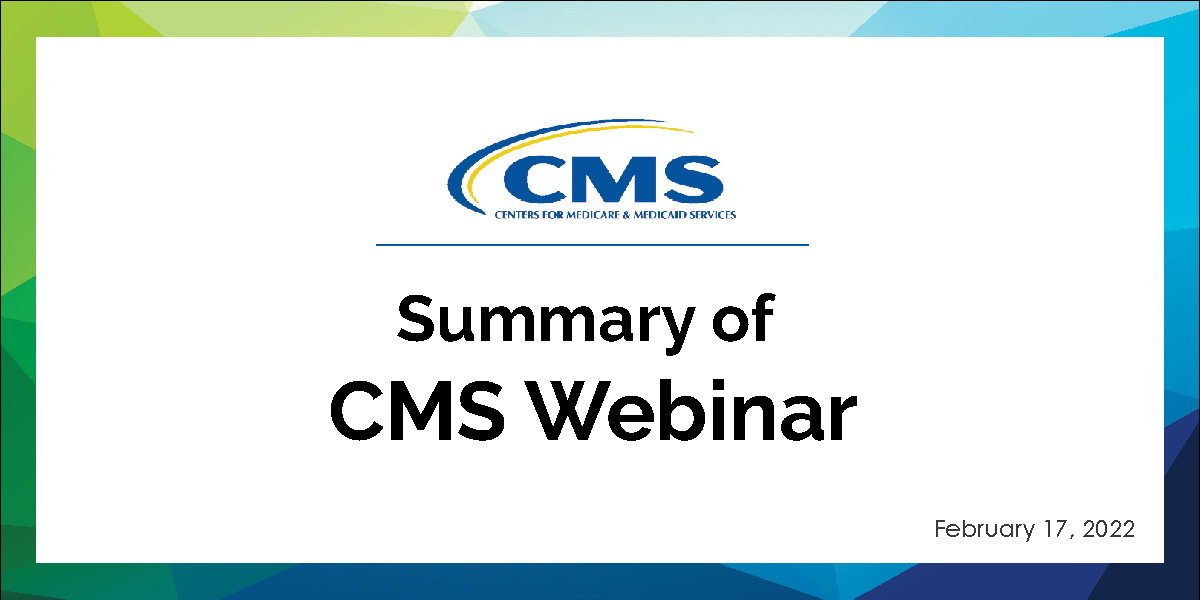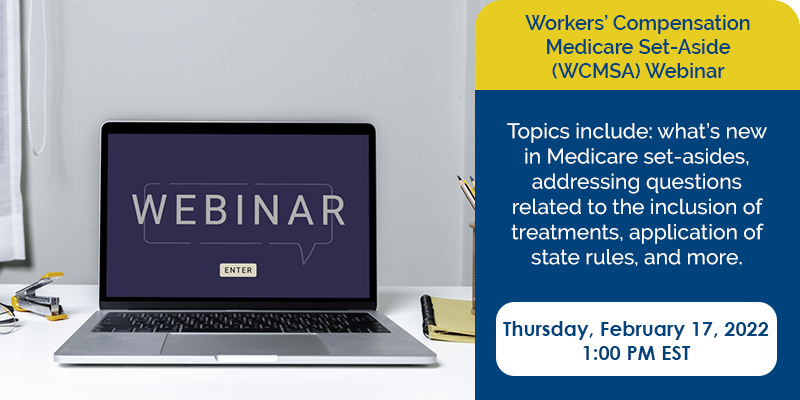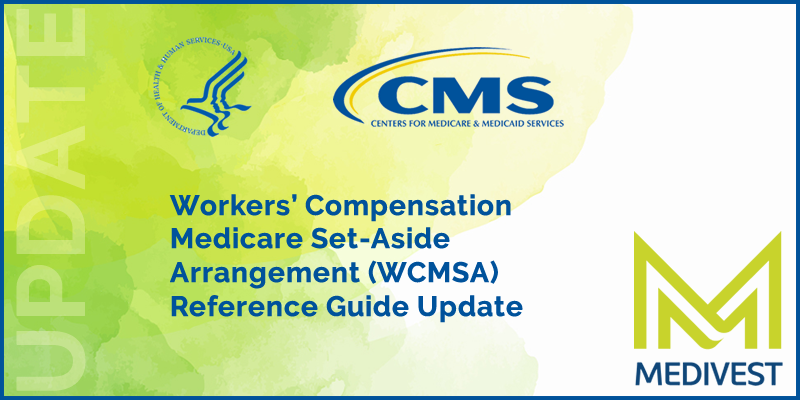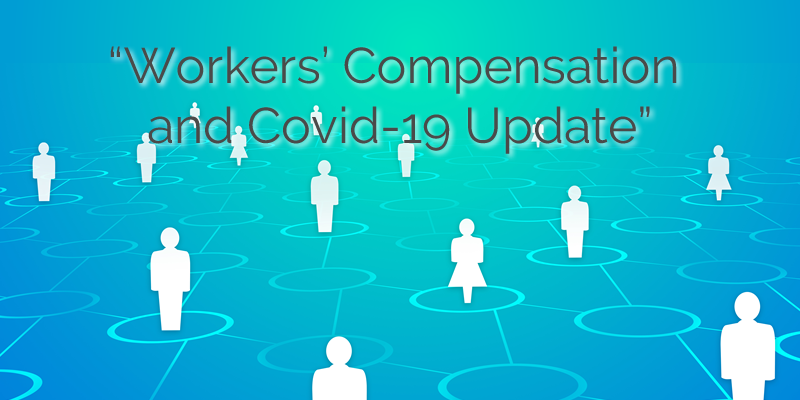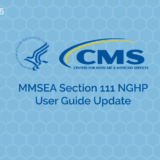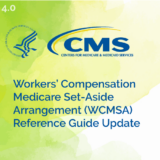On February 17, Centers for Medicare & Medicaid Services (CMS) held a webinar concerning Workers’ Compensation Medicare Set-Aside (WCMSA) and updates from Section 4.3 of the New WCMSA Reference Guide. John Jenkins, Health Insurance Specialist for CMS, and Contracting Officer’s Representative (COR) hosted the presentation and addressed a variety of questions on the topics.
Note: CMS opened the call with a disclaimer indicating that if there are any discrepancies between what is said on the call and what is written in the Workers’ Compensation Medicare Set-Aside Arrangement Reference Guide (WCMSA Reference Guide or Reference Guide), what is written in the Reference Guide will control.
Treatments
When the Injured Worker (IW), due to comorbidities, is not medically cleared to have a recommended surgery CMS still wants the surgery to be included in the Medicare Set-Aside (MSA). It cannot assume the IW will not be able to meet the medical clearance requirement in the future.
No Treatment Necessary
-
According to Jenkins, if there is a reasonable expectation that there is or will be future treatment for an ongoing medical condition, the Workers’ Compensation Review Contractor (WCRC) has a reasonable expectation that future care should be projected. If a specialist opines that care has concluded, the WCRC feels that it is extremely rare that an individual has only one provider, and there may be other providers including a primary treating physician that would recommend future care. If the individual truly does not need future care beyond a settlement and this is documented, the file should not rise to the level that requires submission. *
Medivest commentary: While not specifically mentioned on the call, Section 4.2 of the Reference Guide lists three requirements that should be met for this no future treatment necessary to take effect as an indication that Medicare’s future interests in a settlement are protected:
“4.2 Indications That Medicare’s Interests are Protected
Submitting a WCMSA proposed amount for review is never required. But WC claimants must always protect Medicare’s interests. A WCMSA is not necessary under the following conditions because when all three are true, they indicate that Medicare’s interests are already protected:
-
-
-
-
The facts of the case demonstrate that the injured individual is only being compensated for past medical expenses (i.e., for services furnished prior to the settlement);
-
There is no evidence that the individual is attempting to maximize the other aspects of the settlement (e.g., the lost wages and disability portions of the settlement) to Medicare’s detriment; and
-
The individual’s treating physicians conclude (in writing) that to a reasonable degree of medical certainty the individual will no longer require any Medicare-covered treatments related to the WC injury.”
-
-
-
Denial / State Specific / Hearings on the Merit
-
CMS recognizes there is such a thing as a legal denial. Jenkins emphasized that CMS standards say there must be some written response from a court of competent jurisdiction or associated board with authority under the law, pursuant to a disputed hearing on the merits. CMS will not decide whether a specific medical condition is or is not causally related to the compensated claim or whether it is or is not catastrophic if a statute limits WC benefits after a set time for catastrophic injuries. If you submit an unfunded “Zero MSA” for approval, CMS and its WCRC expects that such legal support will be included as documentation for the same. Any documentation must be signed by the legal authority.
Regarding a Medical Item, Service, or Expense Recommended by the Treating Physician but Denied by an Independent Medical Review (IMR)
-
It depends on whether an alternative treatment plan is provided. In California, the initial IMR denial is only good for a period of one year and does mean that the denial won’t be overturned on appeal. CMS’s position is if a submitter is going to send in a package and has an item, service, or a prescription drug that the IMR states does not meet the requirements of appropriate treatment, then the item, service, or expense will not be considered unwarranted by the WCRC unless an alternative treatment is provided. If there is no alternative item, service, or expense provided by the treating physician after any such denial, CMS will default to what the treating physician originally recommended.
Medivest commentary: This discussion addressed several areas discussed in the Reference Guide under Section 9.4.5 Medical Review Guidelines specifically listed in its subsection titled State-Specific Statutes, with the main points being listed below for additional clarification:
“A submitter requesting that CMS review the applicability of a state WC statute must include a copy of the statute with the submission and indicate to which section the topic in the submission the statute applies.
Submitters requesting alteration to pricing based upon state-legislated time limits must be able to show by finding from a court of competent jurisdiction, or appropriate state entity as assigned by law, that the specific WCMSA proposal does not meet the state’s list of exemptions to the legislative mandate. For those states where treatment is varied by some type of state-authorized utilization review board, the submitter shall include the alternative treatment plan showing what treatment has replaced the treatment in question from the beneficiary’s treating physician for those items deemed unnecessary by the utilization review board. Failure to include these items initially will result in pricing at the full life expectancy of the beneficiary or the original value of treatment without regard to the state utilization review board recommendation.
Note: Failure to include the required documentation at the time of original submission will not constitute a reason for the request of a re-review.”
Regarding RX Drugs
-
CMS is open to input from the MSP compliance community regarding improvements that might be made in the future regarding dispensing fees and the lowest-priced accepted national drug code at below average market rate.
Amended Review Process
-
CMS did not answer the question posed regarding approved cases that are over 72 months old and did not settle and whether the original MSA approval should be funded for approved cases.
Regarding Annual Attestation
-
Jenkins says CMS places a flag in their system related to body parts and treatment as a result of the CMS submission. That flag will not be removed from the system until the individual provides the attestation as per CMS guidelines.
Regarding Data Sharing with Part D Prescription Drug Plans (PDPs)
-
CMS is not currently sharing all data with Part D plans because those part D plans have not specifically requested it.
Regarding Non-CMS Approved MSAs
-
CMS indicated it had received a lot of questions regarding non-submit MSAs, so that was the driving force behind the inclusion of Section 4.3 in the recently updated WCMSA Reference Guide.
-
Jenkins indicated that CMS’s position with under-threshold WC settlements is that they never would have seen them. He indicated that CMS will issue additional clarification on how to handle those cases in the future.
Medivest commentary: Presumably to add clarification to Section 8.1 entitled Review Thresholds that already provides the two specific examples listed below to illustrate CMS expectations when a WC settlement does not meet Workload Review Threshold:
“Example 1: A recent retiree aged 67 and eligible for Medicare benefits under Parts A, B, and D files a WC claim against their former employer for the back injury sustained shortly before retirement that requires future medical care. The claim is offered settlement for a total of $17,000.00. However, this retiree will require the use of an anti-inflammatory drug for the balance of their life. The settling parties must consider CMS’ future interests even though the case would not be eligible for review. Failure to do so could leave settling parties subject to future recoveries for payments related to the injury up to the total value of the settlement ($17,000.00).
Example 2: A 47-year-old steelworker breaks their ankle in such a manner that leaves the individual permanently disabled. As a result, the worker should become eligible for Medicare benefits in the next 30 months based upon eligibility for Social Security Disability benefits. The steelworker is offered a total settlement of $225,000.00, inclusive of future care. Again, there is a likely need for no less than pain management for this future beneficiary. The case would be ineligible for review under the non-CMS-beneficiary standard requiring a case total settlement to be greater than $250,000.00 for review. Not establishing some plan for future care places settling parties at risk for recovery from care related to the WC injury up to the full value of the Settlement.”
-
With respect to non-approved products, CMS is still putting a marker in their system indicating there is a MSA. The marker allows CMS to avoid making payment.
Medivest commentary: What was not discussed was how WC settlements compensating for future medicals but not submitted for approval to CMS (such as Evidence-Based Medicine MSAs or other non-submit WCMSAs) that are reported by Responsible Reporting Entities (RREs) for self-insured employers or WC carriers under Section 111 Mandatory Insurance Reporting will also be flagged for medical denials. RREs report the ICD diagnosis codes being compensated in a settlement at the time of their electronic Section 111 submission of data including the total settlement amount. Because an approved WCMSA amount is not listed for non-submitted WCMSAs, the default in the Common Working File (CWF) for the WCMSA amount is the settlement amount. Therefore, it seems highly likely that CMS will become more and more efficient in setting the system flags to deny future payments of medicals that correspond to compensated ICD codes deemed by RREs to be associated with a WC settlement. While the remedy of a denied medical is an appeal, if the goal is to not have an injured worker experience a future Medicare medical denial, CMS seems to suggest that the best way to address this issue would be to submit those WC settlements that meet workload review thresholds.
-
The non-CMS approved products do not allow CMS to put a marker in the system and block payment. Until recently, no one provided CMS with that documentation.
Medivest commentary: This statement seemed to contradict the prior statement. The theory initially described was that only submitted WCMSAs are flagged for medical denials to help ensure that CMS complies with the MSP by not paying for medicals when the items, services, or expenses for those specific ICD codes were compensated by the WC settlement. There was no discussion during this webinar on the interplay between Section 111 data and the data obtained via the WCMSA submission process. We hope that CMS will clarify this issue moving forward.
-
There is the possibility the beneficiary will have to expend some of their funds outside of the MSA in a non-approved product situation – it was stated CMS was allowed to deny medicals up to the entire net settlement (allowing for a deduction for procurement costs to be consistent with existing MSP regulations).
-
CMS does not recognize the use of structured settlements for non-submitted MSA products. The individual must demonstrate they have exhausted the full value. CMS will only consider them as a lump sum settlement. CMS will not make payment until the full MSA amount has been exhausted even if they are notified the funding of the MSA was via structure.
-
The WCMSA does not demonstrate post-settlement compliance. The WCMSA is strictly an agreement between CMS and the CMS beneficiary about what dollar value/time, CMS will return as a primary payor if they can show the funds were used correctly. This is an agreement between CMS and the beneficiary only.
-
CMS will stick to the release date of Jan 11th, 2022, regarding how it handles the use of non-CMS approved products.
-
“If a non-approved product is priced correctly, Medicare is never going to see a bill.”
Medivest commentary: This was possibly the most important statement made by Jenkins. He is admitting the reality that there certainly can be reasonably priced non-submit MSAs that do exactly what they were intended to do. If the non-submit MSA accurately reflects the Medicare beneficiary’s injury related Medicare covered medicals and is exhausted exclusively for those purposes, then clearly Medicare’s interests have been protected because Medicare will not be prematurely (or ever) billed for those medicals.
Medivest will continue to monitor changes occurring at CMS and will keep its readers up to date when such changes are announced. For questions, feel free to reach out to the Medivest representative in your area by clicking here or call us direct at 877.725.2467. For any specific questions regarding MSAs of any type, click here.


